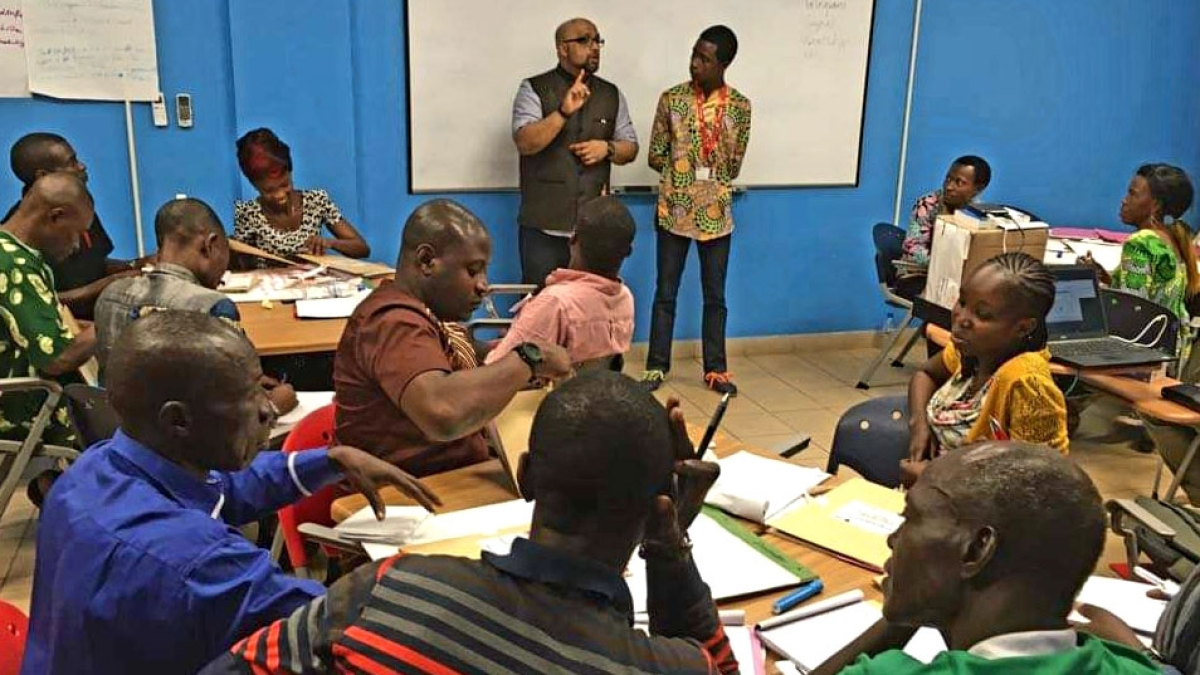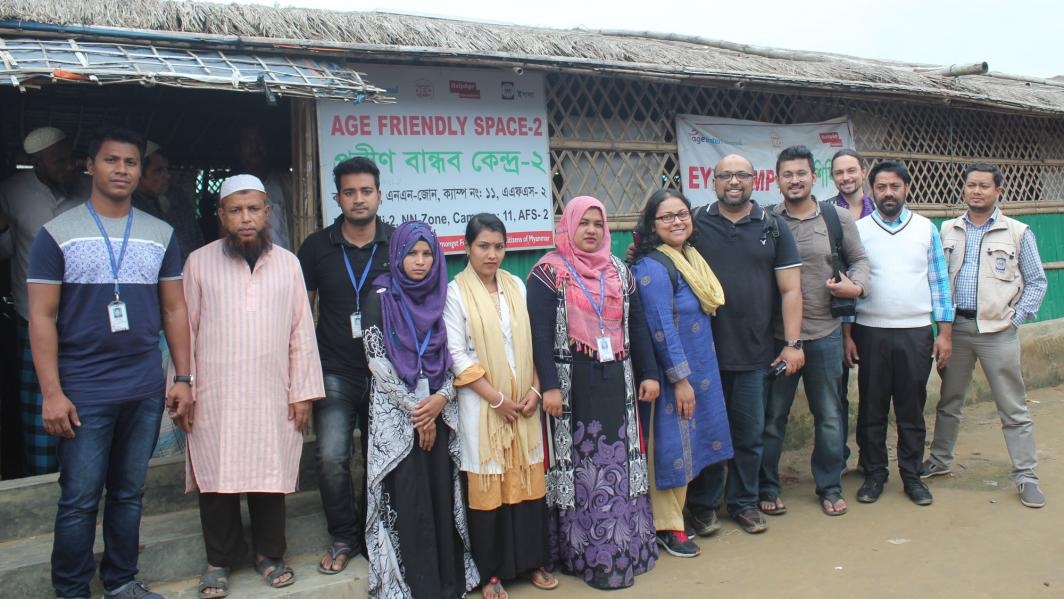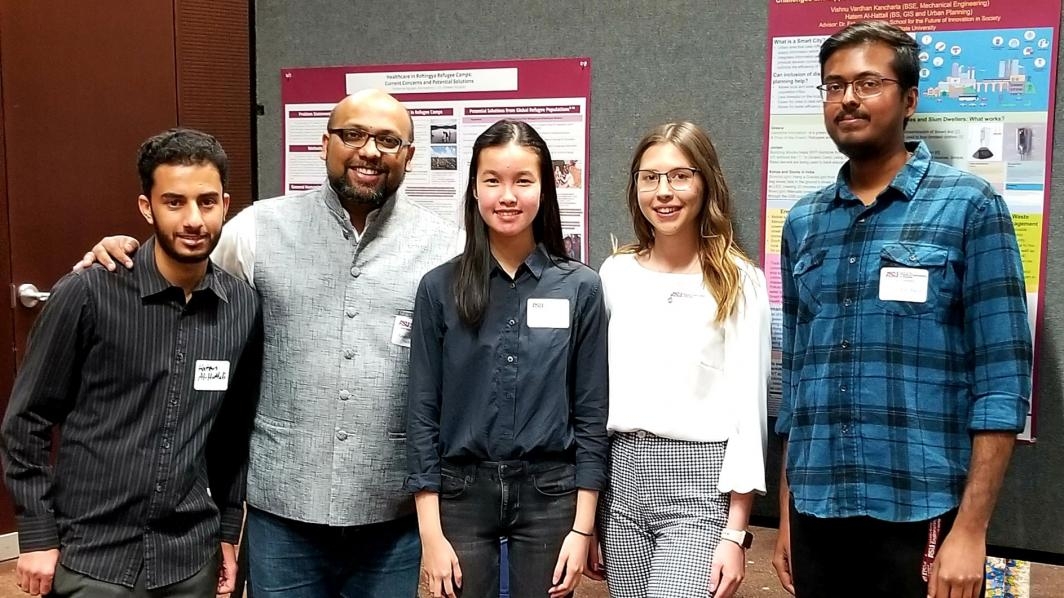Refugees add new dimensions to the digital communication discussion

Faheem Hussain (center, top) leads a workshop on fake news detection using hybrid solutions at the American Center at the U.S. Embassy at Bangui, Central African Republic.
A visit to Rohingya refugee camps in his home country of Bangladesh changed the course of Faheem Hussain’s research.
“The refugee crisis was never my core interest as a researcher,” he explained, “but what I saw there completely blew my mind! After that, I totally revised and evolved my work.”
This new direction is bringing the frequently unheard perspectives of at-risk populations into discussions about how digital communication technologies, such as the internet and social media, are developed and used. Hussain, a clinical assistant professor in the School for the Future of Innovation in Society, explores the intersection of communication innovations and issues of access and equity.
“My research focuses on access to information and consideration of digital access as a human right,” he said.
Recent trips to the Central African Republic and Bangladesh have enabled Hussain to delve deeper into the reality of accessibility of information for refugees and populations embroiled in conflict. His work is shedding light on the role of fake news, women’s access to communication technologies and barriers to education.
With degrees in engineering, telecommunications management and computer science, Hussain’s technical expertise was leveraged in a workshop in the Central African Republic, a country beset by conflict and pervasive violence. The workshop was organized by Internews, and funded by the U.S. State Department. The violent conditions in the Central African Republic restrict travel and challenge communication, thus opening the door for the proliferation of fake news often wielded to inflame tensions.
A four-day January workshop brought together radio broadcasters and internet bloggers based in the Central African Republic to conceptualize a common news-sharing platform with the goal of establishing a more accurate and reliable information resource.
Hussain explained, “We came up with some strategies on how they can work together as professionals to build an anti-fake news network using radio broadcasting and social media."
Six projects were funded including one to develop a mechanism to detect and counter fake news, and another to feature and celebrate aspects of local culture.
A continent away, fake news also surfaced among the issues Hussain examined during a December visit to a Rohingya refugee camp in Bangladesh. There, he talked to refugees about options for education and women’s access to information as he researched their perspectives and attitudes about the future of the internet.
This was part of 12 pilot forums for the Global Citizens’ Debate “We, the Internet” being developed by the ASU Consortium for Science, Policy and Outcomes and France’s Missions Publiques to take place in fall 2019. Led by Associate Director for DC Operations Mahmud Farooque in collaboration with Professor Katina Michael, the pilots used an open framing approach to ask citizens about their hopes and concerns about the Internet.
“It is to ensure that citizens are included with the experts and stakeholders in framing the issues and questions for the global dialogue,” Farooque said.
Participants were asked questions including how the internet helps them or presents challenges in their lives and how they think it will evolve in the future.
“I thought it was imperative to include the Rohingyas in this initiative because they are one of the first populations to be persecuted using social media like Facebook and WhatsApp,” Hussain explained. “It was surreal for us to be asking questions about the future of the internet in an area that has little or no internet service. But this displaced population — over a million people and still increasing — is being directly affected by these technologies, and it is essential to get their perspectives and aspirations into this conversation.”
As Hussain examined how refugees are using digital technologies such as mobile phones and laptops to access information and content, he observed an interesting dichotomy: women in the camps are recruited and trained to repair mobile phones — a common commodity, yet the social norms restrict their ability to fully utilize the devices. They are permitted to talk on the phones, but other functions such as using apps or downloading videos and other content (available in makeshift shops with laptops) are prohibited by cultural mores.
Hussain is working with colleagues at the school to channel his research data into practical solutions. He is collaborating with Mary Jane Parmentier, program chair of the school’s Global Technology and Development program, to identify and analyze the key challenges faced by the Rohingyas regarding access to information and communication technologies. Hussain and Nalini Chhetri, associate director of international initiatives and clinical associate professor, are developing “Five-minute School” curricula — as a series of brief educational videos co-created with refugees to address the needs of their community. The lessons will be accessible on mobile phones and feature recordings of Rohingya presenters addressing topics such as drug trafficking, human trafficking or gender equity. Among the challenges to providing education in the refugee camps is the lack of a written form of the Rohingya’s language.
“The whole idea is that they will be speaking in their own language, and they will decide what things really matter to them,” Hussain said.
Energy is another challenge in the camps. The stripping of local trees, which were taken for fuel and expansion of the camps, has created an environmental crisis in the area compounded by a shortage of energy sources. Hussain is assembling a team with Professor Clark Miller, who has led research efforts on the social drivers and dynamics of energy system change, to focus on sustainable energy solutions in the camps.
Hussain’s work is also pushing boundaries to include issues related to research on displacement and refugees within the field of information and communication technology for development. Recently in Tanzania, he co-chaired the session “ICT for Displaced Population and Refugees” in the International Conference on Social Implications of Computers in Developing Countries, where researchers from the U.S., Europe and Asia shared their latest findings and challenges related to refugees and ICTs.
ASU undergraduates under Hussain’s guidance have also become involved in the research, resulting in eight poster presentations at the school’s semiannual poster jamborees. They have been pairing their personal special interests with his data to produce a series of original research projects on challenges faced by Rohingya refugees in areas including health care, women’s empowerment, education, sustainable energy usage and “smart refugee camps” — explained by Hussain as “a concept that champions sustainable, equitable, and representative design of refugee or displaced populations’ settlements, using smart, hybrid and cost-effective sociotechnological solutions.”
Further opportunities are opening for student involvement via a grant ASU’s Study Abroad program has awarded for Hussain and Parmentier to design a new program in Bangladesh, which they hope to launch in 2020.
“I am excited to integrate smart design and sustainability into this new initiative focusing on human displacement and socioeconomic development. I hope to see sustainability become more normalized in refugee response or any rapid displacement situations for the benefit of displaced people and the countries hosting them,” Hussain explained. “Such a program will be able to offer hands-on learning for students in design and development thinking related to ongoing and futuristic issues for the ever-growing displaced population.”
More Arts, humanities and education

ASU professor, alum named Yamaha '40 Under 40' outstanding music educators
A music career conference that connects college students with such industry leaders as Timbaland. A K–12 program that…

ASU's Poitier Film School to host master classes, screening series with visionary filmmakers
Rodrigo Reyes, the acclaimed Mexican American filmmaker and Guggenheim Fellow whose 2022 documentary “Sansón and Me” won the Best…

Pen Project helps unlock writing talent for incarcerated writers
It’s a typical Monday afternoon and Lance Graham is on his way to the Arizona State Prison in Goodyear.It’s a familiar scene.…



